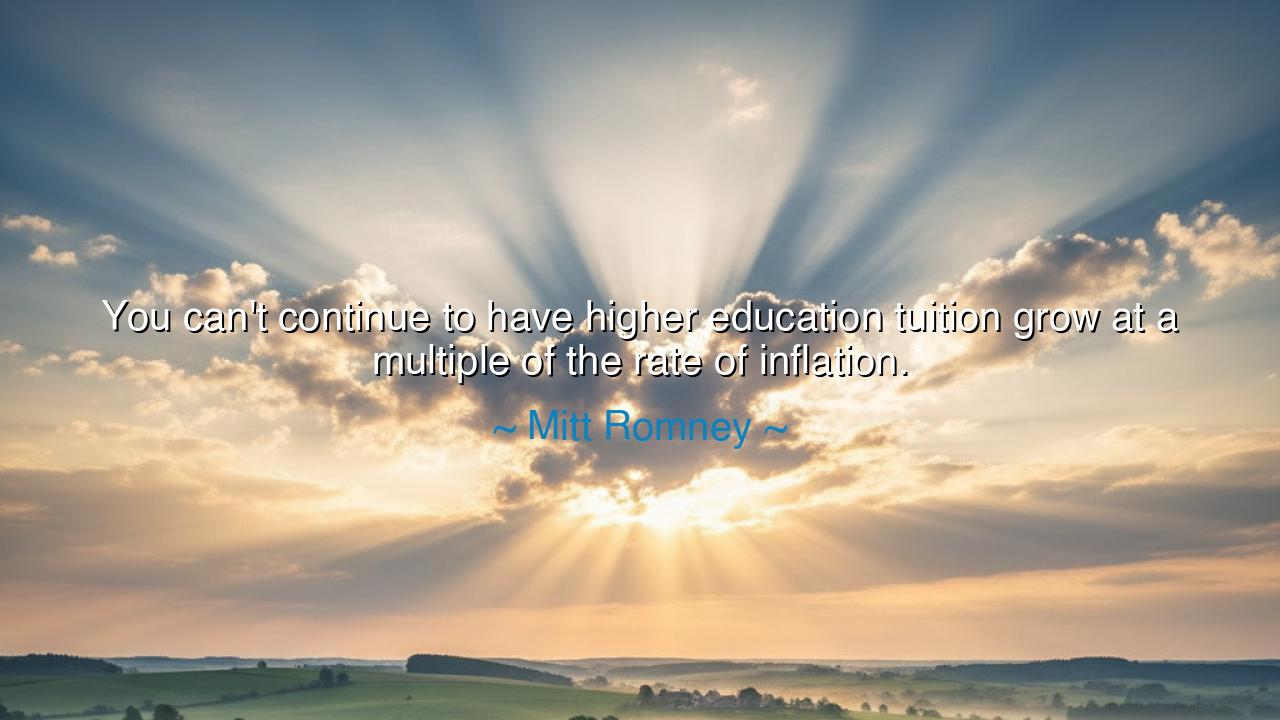
You can't continue to have higher education tuition grow at a
You can't continue to have higher education tuition grow at a multiple of the rate of inflation.






The words of Mitt Romney sound as a warning bell across the halls of learning: “You can’t continue to have higher education tuition grow at a multiple of the rate of inflation.” In this truth lies the cry of a generation weighed down by chains of debt, their pursuit of wisdom turned into a burden of servitude. Education, which should be the ladder by which the humble climb to greatness, risks becoming instead a trap, where each step upward costs more than the last, and the summit seems ever farther away. Romney’s words are not the lament of an idle critic, but the recognition of an imbalance that cannot endure.
For what is inflation but the measure of the rising tide of prices across society? And yet, when tuition rises at many times that rate, it outpaces the ability of families to provide, of students to save, of governments to support. The cost of knowledge grows heavier than the cost of food, shelter, or health. This is not merely a problem of numbers, but of justice: for when only the wealthy can afford the keys to education, the gates of opportunity close upon the poor, and the promise of equality is broken.
Consider the example of the medieval universities of Europe, where in times of old, education was often supported by guilds, churches, or patrons, so that even those of humble origin might rise by merit. The great theologian Thomas Aquinas and the scholar Erasmus did not pay the crushing sums modern students face. Their learning was not a privilege for the wealthy few, but a trust for the advancement of civilization. When education was accessible, it became the engine of the Renaissance and the Reformation. When it is locked away behind walls of gold, society itself withers.
In modern times, we see the rise of the student debt crisis in America. Millions of young men and women, eager to learn and contribute, find themselves burdened for decades by debts greater than the cost of homes or farms in earlier centuries. Their creativity is stifled, their risk-taking crushed, their freedom narrowed. Instead of emerging into life as free citizens, they enter it already shackled. This, Romney warns, is unsustainable. A society that devours its young cannot prosper; a nation that makes learning unaffordable weakens its own foundation.
The meaning of Romney’s words is not simply economic, but moral. For if higher education is the forge where minds are sharpened and leaders are made, then to price it beyond the reach of many is to squander the most precious resource of all: human potential. Inflation is the rising current, but tuition that grows beyond it is the storm that capsizes the ship. No nation can long endure when wisdom becomes a luxury, and ignorance the inheritance of the many.
The lesson, then, is clear: we must demand balance. Let education remain costly in effort, in discipline, in sacrifice of time—but not ruinously costly in gold. Citizens must press their leaders, institutions must reform their practices, and families must teach their children that learning need not always wear the robe of debt. Knowledge can be found in books, in libraries, in the shared wisdom of communities, while formal institutions must be held accountable to keep their charges just and fair.
Therefore, O listener, take these words to heart: education must remain a ladder, not a wall. If the ladder is raised beyond reach, then only the privileged may climb, and the republic is betrayed. But if its steps are kept steady, affordable, and open, then every child may ascend, and the nation itself shall rise with them. Let us then watch closely the cost of learning, and fight for its fairness, for upon it rests not only the fate of individuals, but the destiny of our civilization.
For in the end, Romney’s warning is eternal: the price of knowledge must not outstrip the means of those who seek it. When it does, hope itself is taxed, and the light of progress dims. Guard education, therefore, as both treasure and right, and ensure its doors are never closed by the weight of unjust cost. For the mind is the wealth of a people, and no people can afford to bankrupt their own future.






AAdministratorAdministrator
Welcome, honored guests. Please leave a comment, we will respond soon